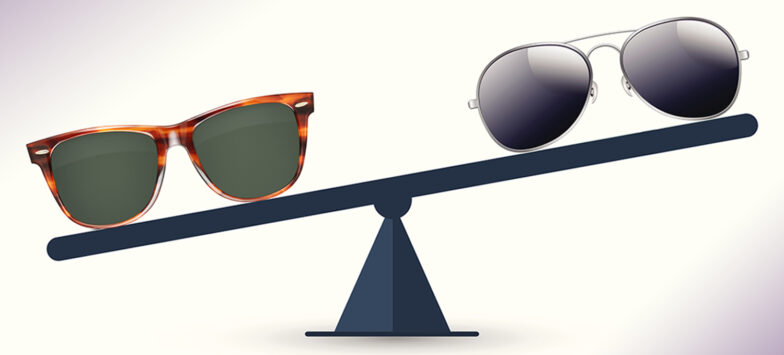
July is UV Safety Month – Here’s Why All Sunglasses are Not Created Equal
Sunglasses may be a fun fashion accessory, but more importantly, they should protect our eyes from ultraviolet (UV) rays produced by the sun. These UV rays—including UVA and especially UVB— damage the eye’s surface tissues, cornea, and lens. Over time, that damage can lead to cataracts, macular degeneration, and other vision-stealing eye conditions.
So when choosing sunglasses, you’ll want to keep in mind the following tips from the American Academy of Ophthalmology to make sure you’re getting the best possible protection for your eyes.
1. Insist on 100%
When buying sunglasses, ask your Atlantic Eye optician if they provide 100 percent protection from all UV light. If you’re buying from a store, look for a tag or label with that guarantee – don’t settle for less.
2. Darker doesn’t mean better
Don’t be fooled into thinking the darker the lens, the safer they are for your eyes. Only sunglasses with 100% UV protection provide the safety you need.
3. Polarized lenses alone don’t block UV rays
Polarized lenses reduce the glare of light reflected from the surface of water or roads, which can be helpful when driving, boating, or golfing. But polarization alone does not block UV radiation. If you want polarized lenses, look for those that also provide maximum UV protection.
4. Size matters
If you love the look of big sunglasses, you’re in luck — oversized or wraparound-style sunglasses help to limit UV rays from entering from the sides of the glasses.
5. Color, not so much
As with dark lenses, colored lenses (such as amber or gray) don’t block more sun. Do not assume that any colored lenses or metallic mirror coatings will fully protect against UV rays.
6. A higher price tag does not mean more protection
A less expensive pair that is labeled as 100 percent UV-blocking is a better choice than the high-end one that isn’t.
7. Some absolute No-Nos!
Remember that no sunglasses will be enough to protect your eyes if you stare directly at the sun – including during a solar eclipse. The same goes for tanning beds, sunlamps, snowfields, and arc welding, which require specially filtered safety eye protection. (For more on eye safety, go to https://atlanticeye.com/2021/03/)
U.V. light is invisible but always present during the day, even when we can’t see or feel the sun. So we need to protect our eyes even on cloudy days and in every season. Your experienced Atlantic Eye optician will help you select the sunglasses that provide that all-important 100%, while also flattering your face (https://atlanticeye.com/2022/05/confused-about-the-right-frames-for-your-face-youre-not-alone/) and complementing your look.
